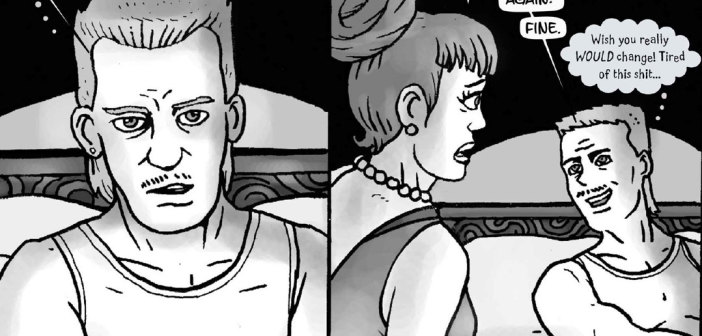If I were to evaluate Mike Luoma’s outlook on humanity based off of his independent comic book, Everybody Lies, then I’d say he’s a bit of a misanthrope. Writer/letterer Luoma has created a “slice-of-life cautionary tale for grownups” that sets out to examine the reasons and consequences of why we all tell little white lies and how they escalate into dangerous scenarios of mistrust and hurt feelings.
But Luoma’s book is more a depressed tale than it is a cautionary one, always lunging for the most extreme of circumstances and cooking up the most depraved of outcomes. As I read this comic, I could not help but be reminded of Adrian Tomine’s work, specifically Shortcomings, and, to a lesser extent, Charles Burns’ Black Hole. But the slice-of-life jaunts that Tomine is known for are subtle, whereas Luoma’s story is sensationalized; meanwhile, Burns’ eerie allegories are cryptic and unsettling, while Luoma is blunt and a bit harsh.
Everybody Lies tells the story of four people with interlocking lives: Angela, Spike, Margie, and Dave. Angela and Spike are dating, and while they pretend to love each other; they are secretly mistrustful and bitter. To all appearances, the married couple, Margie and Dave, is tumultuous and unhappy, and while it is, there are some genuine sparks of love here and there.
The story opens with a dinner date between the two couples; Angela and Margie are sisters, whereas the gentlemen in the respective relationships simply don’t like each other. It’s no wonder: they are both highly unlikable people. I personally couldn’t stand them from the moment they were introduced and rooted for their downfalls from the beginning. All Spike thinks about is how many extra pounds Angela is packing on and how he’d rather bed the slim and lovely Margie. The greatest concern Dave has is when and where he’s going to find his next drink.
Angela and Margie are not much better. The former is weight-obsessed, and while many of us in the United States worry about our scale readings, Angela’s ranting and raving is forced and irritating. Margie, on the other hand, is a young chippie prone to whining and crying fits. The shallow personalities of these four characters only intensify as the book treads on, beginning with the finale of the dinner date. Over the course of a few days and nights that follow, some sexual misconduct takes place, and the characters of the book begin a bleak and downward spiral that is colder and darker than deep space.
Perhaps this is what Luoma wanted. And perhaps this almost nihilistic look at suburban American life would have worked if it weren’t for the continuous use of thought bubbles throughout the book from beginning to end. Whenever a character says anything in a word balloon, Luoma inserts a thought bubble to refute that which is said. It’s repetitive and unnecessary in the comic book medium. Consider Tomine’s Shortcomings, for example: in a general sense, that book and this one are about the same thing, but Tomine uses a lot of looks and posing to inform his readers when his characters are being duplicitous and unfaithful. Sometimes he doesn’t give readers anything, and it’s up to them to make such determinations, much like we have to do in our everyday lives.
But Luoma is unforgiving as he pummels us with the worst of scenarios happening to the most unlikable people. The sick part is I didn’t care when the unfortunate happenings began to stack up against the characters. For all of their shallowness and superficiality, and not necessarily their lying and dishonesty, everyone gets what they deserve. But is such a bitter and bleak moral what someone wants at the end of their story?
This comic book review originally appeared on Broken Frontier on 24 March 2010.




